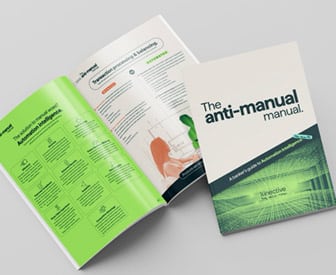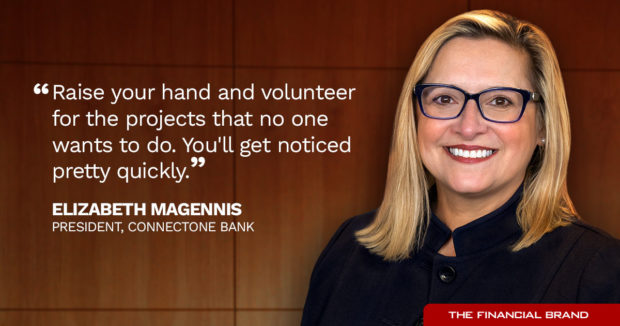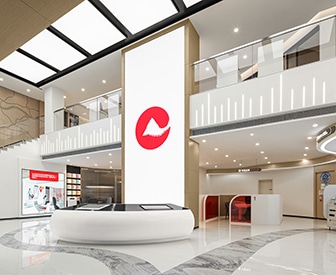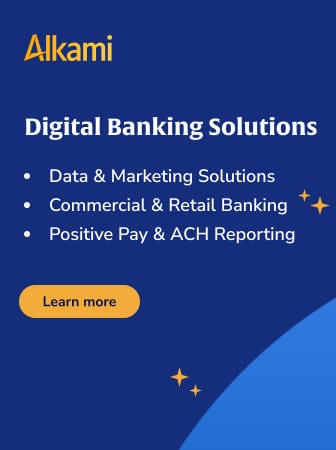Two decades ago, Elizabeth Magennis, now the president at ConnectOne Bank in Englewood Cliffs, N.J., was just starting out as a small-business lender at another institution. She was the only woman in a commercial lending group of older men who hadn’t quite accepted her yet.
“They were not thrilled that I was there,” Magennis, who goes by “Liz,” recalls. “I was younger, I was a woman. They had their own little ‘old-boy’ network going on. So it was a tough situation for me to walk into.”
But Magennis is not one to give up. “I looked at this as an opportunity,” she says.
And then, an opportunity to crack this nut came.

The New AI: A Banker’s Guide to Automation Intelligence
Manual tasks across channels is costly. And while AI is hot, there’s a simpler way to bring efficiency that many bankers have overlooked.
Read More about The New AI: A Banker’s Guide to Automation Intelligence

Improve Your Business Outcomes Through Data & Analytics
Gain centralized access to the credit bureaus and 20+ alternative data sources. Leverage advanced analytics to optimize marketing campaigns and loan decisions.
Read More about Improve Your Business Outcomes Through Data & Analytics
Volunteer for the ‘Dirty’ Work That Others Shun
The bank began a major promotion of its lending products and the president handed Magennis’ colleagues a printout listing the clients of each lender. He wanted them to call every client to talk up the promotion, and he kept popping back in, asking how far through their lists they had gotten.
“They were managing very large portfolios,” says Magennis. Every time the president came around, the lenders complained that they were already inundated with their regular work. They hadn’t touched the lists yet.
“I went to the lenders and I asked if I could help them,” Magennis says. She took all of their lists — each had been given around 30 companies to call — and worked her way through the names.
“Doing that did a couple of things,” she says today. “I built goodwill with all of those lenders. The customers now knew who I was in the organization, and so, when they couldn’t get hold of their lender, they would call me. The president was happy that we had gotten through the lists. So it was a win for everyone.”
Magennis shares the story to illustrate a point. The $9.6 billion-asset ConnectOne has a summer internship program, and Magennis says each crop of interns always asks, “How do you get noticed in an organization?”
“I always tell them, ‘Raise your hand and volunteer for the projects that no one wants to do. You’ll get noticed pretty quickly. ‘”
One of today’s workplace trends, “quiet quitting,” is the opposite. But Magennis says this wouldn’t work at her current bank — ConnectOne is too lean.
“We’re not a good place to hide if you’re trying to skate by and not do your job,” says Magennis, who spent much of her career as a working single mother of two daughters.
“We do a good job of identifying people who are not engaged and who can’t carry their workload,” she adds. “We try to coach them to get them to the level where they need to be. Sometimes it works out and sometimes it just doesn’t.”
Read More:
- Behind the Scenes with Citigroup’s Jane Fraser During the Bank Run Crisis
- 7 Insights from Women Banking Leaders on How to Create a Winning Customer Experience Strategy
- 6 Women Leaders Discuss Progress of Gender Equality in Banking
Two Ways to ‘Raise Your Hand’ — Both Important
Research shows that “raising a hand” to pursue an opportunity — to work on a big project or to advance to a new role — is something many women struggle with, Magennis says.
Women tend to want to have all the skills listed in a job ad, or have mastery of whatever is needed to do a particular task, before they ask to be considered. Men are more likely to jump in when they’ve got just some of the skills, thinking they can learn the rest as they go, she says.
“I tell this to everyone on our team: ‘It’s important to raise your hand when you need help.’”
— Elizabeth Magennis, ConnectOne Bank
But in the course of her career, Magennis has discovered that women in banking sometimes have trouble raising a hand in another sense too. That is, raising a hand to ask for assistance. This applies in many ways, from a request for a little help getting a task done to a request for mentorship.
Magennis says other women often want to know how she balances work and family life — and asking for help proved essential in that regard.
“Many women don’t raise their hand, and are guilty of doing that both at home and at work,” says Magennis. “I tell this to everyone on our team: ‘It’s important to raise your hand when you need help.’”
She thinks men feel more comfortable asking for an extra hand or even for someone else to fill in for them. “Women seem to have to think they can handle whatever it is on their own,” she says. “But I encourage our people, regardless of gender, to seek out support from others.”
Magennis takes her own advice.
Even though she has more than 35 years of banking experience, Magennis still calls on a former colleague and mentor who is now retired. Richard Tappen continuously shared what he learned from a career of business banking with Magennis after she arrived at ConnectOne. He had many years of experience when he joined the bank to handle specialty business lending.
Magennis asked him to stay on longer when he decided he wanted to retire. She felt there was more he could teach, and his special skills were such that it would take time to replace him.
“I still meet with him once a quarter to pick his brain,” she says, “and, you know, just do a little venting.” They have always talked not only about business lending, but management challenges in general.
“I think it’s important for everyone that’s coming up in banking to have someone like him, someone they can lean on and rely on to help guide them,” Magennis says. “And, you know, he doesn’t always have all the answers — but he definitely gave me some really great pointers on where to find the answers. And that was just as valuable.”
Read More: Citi’s Chief Client Officer: People, Passion, Purpose Drive Banking Quality

Her Journey in Business Banking Continues at ConnectOne
Magennis is part of the growth story at the bank, having come on board back when it was still North Jersey Commercial Bank.
Frank Sorrentino III, who is still the chairman and chief executive officer, founded the bank under that name in 2005, after a career in construction. He felt no other institution in the immediate area was hitting the mark on business banking.
But ConnectOne is no longer just a local N.J. bank. Today it serves business customers across New York City and all the way out to Montauk. It has branches on Long Island and in northern suburbs of the city, as well as one in Florida. Some customers are longstanding ones that the bank is willing to follow into new geographic market areas when needed.
Magennis came aboard in 2006, as executive vice president and chief lending officer, shortly after the bank’s founding. She became president in 2020.
Growing up in the borough of Queens, Magennis felt drawn to finance and to the tall Manhattan buildings always on the horizon, often picturing herself working on Wall Street as a trader. Along the way she switched her ambitions to banking — it seemed a better fit, somehow — and her first job was in the personal banking training program at Irving Trust. It was a great learning opportunity, says Magennis, in part because of its commitment to bringing women along in the banking business at a time when that was not so common.
However, this was in the 1980s, and “The Irving,” as New Yorkers used to call it, was getting a lot of unwanted attention. The Bank of New York, then a major retail bank, was building a geographic empire. Irving and its parent company, Charter New York, looked like attractive targets. Bank of New York mounted one of the industry’s few explicitly hostile takeovers, and, in the end, bought Irving and made extensive job cuts.
“It was quite an experience,” says Magennis, who survived the purge, but recalls how uncomfortable and full of uncertainties she was during that time.
She did learn something from it though. “It’s important to be open-minded and open to change,” she says, adding that the concept applies both to individual bankers and to banks.
Read More: How Financial Marketers May Be Unintentionally Disrespecting Mothers

Join industry’s leading AI conference - free passes available!
Ai4 is coming to Las Vegas, August 12-14 2024. Join thousands of executives and technology innovators at the epicenter of the AI community.
Read More about Join industry’s leading AI conference - free passes available!

Why Industry Cloud for Banking?
PwC’s Industry Cloud for Banking helps deliver personalized products and services that today’s customers expect.
Liz Magennis Is Still in a New York State of Mind
Having spent much of her early career in New York City has stood Magennis in good stead. She often worked with clients in the garment industry and in real estate development. “I learned the art of negotiation,” Magennis says. “I think the competitive landscape in the New York City metro market makes you grittier.”
Having this background helped her acquire a sense of urgency in customer service that has paid dividends. “This is not to say that other bankers don’t have that, but I think that we’re in such a fast-paced environment with so much competition, that it is now one of the traits I look for when I hire.”
“When people say, ‘My bank is ConnectOne,’ that’s when I know we have a relationship.”
— Elizabeth Magennis, ConnectOne Bank
She prefers to hire “Type As” and gravitates to those who have been involved in team sports because, she says, they know what it is like to compete, but also what it takes to cooperate as part of a group with a common goal. Willingness to take responsibility is also a plus.
For herself, business banking was attractive because it demanded creativity.
“No two clients are alike,” says Magennis. “Often a client comes to us and says they need this or that. You start digging through their story, and how they run their business, what they’re selling, and you might come to a different conclusion.” Then it’s the banker’s job, she explains, to say, you asked for this solution, but I think this other option will help you more — and here’s why.
Magennis, who still handles clients even as president, doesn’t measure success by the amount of deposits brought in or the loan balance. For her, it is not so easily quantified.
“When people say, ‘My bank is ConnectOne,’ that’s when I know we have a relationship,” she says.
Read More: The Future of Business Banking: Fintech Innovation + Human Advice

On Fostering More Diversity in Banking’s Senior Ranks
In her career, Magennis has worked for female bosses who were supercompetitive with their female colleagues. But that won’t work, she says, if the goal is to create a culture that fosters more diversity — especially in the senior ranks.
“Women leaders should be bringing other women along with us, empowering them and mentoring them,” Magennis says.
ConnectOne’s efforts to bring women along includes a resource group. Women in the group support each other and plan events, which can get them more exposure across the bank, Magennis says.
It helps that ConnectOne has been progressive in this regard from the beginning, she adds. Since Sorrentino was not a banker by background, “he didn’t have a jaded view of what a banker network should look like,” she says.
Back when she joined 15 years ago, Magennis was impressed that just over half of Sorrentino’s direct reports were women.








